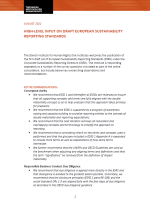
High-level input on draft European sustainability reporting standards
Having strong and uniform EU-wide reporting standards on sustainability, including as it relates to human rights, has the potential to significantly improve corporate reporting on these matters, drive improved implementation practices and allow external stakeholders, including affected stakeholders, to access relevant information and assess the adequacy of corporate responses to potential and actual negative human rights impacts.
The draft ESRS mark a significant step forward, however, some concerns remain around the overall architecture as well as specific disclosure components.
The Danish Institute for Human Rights makes a number of submissions on the following issues in response to the consultation on the exposure drafts of the ESRS, including the need to:
- Clarify concepts around double materiality, information quality and the rebuttable presumption to ensure that users understand what they are expected to report and encourage meaningful reporting;
- Rely more explicitly on the process of due diligence as articulated in the UN Guiding Principles on Business and Human Rights;
- Clarify how information should be gathered and when approximation processes should be used, ensuring that adequate incentives are given to collect data rather than estimate;
- Incentivise preparers to consider and disclose information around cross-topical aspects of their material sustainability impacts, in recognition of the interdependencies between environmental, social and governance elements;
- Provide clearer guidance explaining the interconnectivity of the cross-cutting requirements and the topical standards in the implementation and reporting on the undertaking’s due diligence;
- Have a clearer and more prominent place in the architecture for disclosures on remedy and ensure that requirements that relate to remedy and grievance mechanisms are aligned fully with UNGPs;
- Require preparers explicitly to consider impacts across the full range of rights and undertake an impact materiality analysis on this basis, using the ESRS as a non-exhaustive guide in terms of topics of relevance to specific stakeholder groups;
- Strengthen disclosures on social outcomes by strengthening performance measures included in S1 and developing performance measures for ESRS S2-S4; and
- Encourage, to the extent possible, standardised reporting formats to enable users to assess and compare company practice including through the use of big data technology.
We strive to make the pdf versions of our publications etc. accessible for screen readers. If you experience any problems, please contact Digital Editor Stine Juhl Nielsen on stni@humanrights.dk
